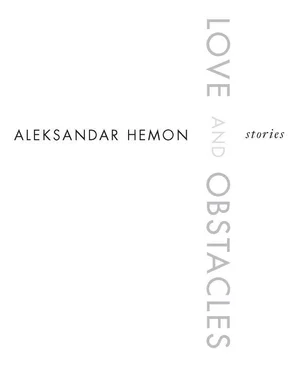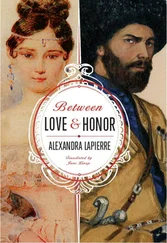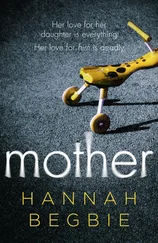Aleksandar Hemon - Love and Obstacles
Здесь есть возможность читать онлайн «Aleksandar Hemon - Love and Obstacles» весь текст электронной книги совершенно бесплатно (целиком полную версию без сокращений). В некоторых случаях можно слушать аудио, скачать через торрент в формате fb2 и присутствует краткое содержание. Издательство: Penguin USA, Inc., Жанр: Старинная литература, на английском языке. Описание произведения, (предисловие) а так же отзывы посетителей доступны на портале библиотеки ЛибКат.
- Название:Love and Obstacles
- Автор:
- Издательство:Penguin USA, Inc.
- Жанр:
- Год:неизвестен
- ISBN:нет данных
- Рейтинг книги:5 / 5. Голосов: 1
-
Избранное:Добавить в избранное
- Отзывы:
-
Ваша оценка:
- 100
- 1
- 2
- 3
- 4
- 5
Love and Obstacles: краткое содержание, описание и аннотация
Предлагаем к чтению аннотацию, описание, краткое содержание или предисловие (зависит от того, что написал сам автор книги «Love and Obstacles»). Если вы не нашли необходимую информацию о книге — напишите в комментариях, мы постараемся отыскать её.
Love and Obstacles — читать онлайн бесплатно полную книгу (весь текст) целиком
Ниже представлен текст книги, разбитый по страницам. Система сохранения места последней прочитанной страницы, позволяет с удобством читать онлайн бесплатно книгу «Love and Obstacles», без необходимости каждый раз заново искать на чём Вы остановились. Поставьте закладку, и сможете в любой момент перейти на страницу, на которой закончили чтение.
Интервал:
Закладка:
At which point I stood up and left the room.
He had drunk water from Baščaršija, but he had no trouble forgetting Sarajevo. Not even a postcard did he ever send us; once he was gone from our lives, he was gone for good. For a while, every time we talked on the phone Father asked me if I had spoken with my friend Macalister, and I never had, whereupon Father would suggest it would be good for me to stay friends with him. Invariably, I had to explain that we had never been and never would be friends. “Americans are cold,” Mother diagnosed the predicament.
I did go to see him when he came to Chicago to read at the library. I sat in a back row, far from the stage, well beyond the reach of his gaze. He wore the same Birkenstocks and white socks, but the shirt was no longer Hawaiian. It was flannel now, and there were blotches of gray in his Bakelite hair. Time does nothing but hand you down shabbier and older things.
He read from Nothing We Say, a passage in which Cupper flipped out in a mall, tore a public phone off the wall, and then beat a security guard well beyond unconscious with the handset, until he found himself surrounded by the police aiming guns at him:
The feral eyes beyond the cocked guns glared at Cupper. His hand was suspended midair over the security guard, the blood-washed earpiece ready to break the man’s face completely open. The security guard whimpered and gurgled up a couple of pink bubbles. The cops were screaming at him, but Cupper could hear nothing—they opened and closed their mouths like dying fish. He recognized they were burning to shoot him, and it was their zeal that made him want to live. He wanted them to keep being bothered by his existence. He straightened up, dropped the earpiece, pressed his hands against the nape of his neck. The first kick rolled him off to the side. The second kick broke his ribs. The third one made him groan with pleasure. He turned them to hating his guts.
Macalister lowered his voice to make it more hoarse and smoky; he kept lowering it as the violence increased. Somebody gasped; the woman next to me leaned forward and put her bejeweled hand on her mouth in a delicate gesture of horror. I didn’t, of course, wait in line so he could sign my book; I didn’t have Nothing We Say with me. But I watched him as he looked up at his enthralled readers, pressing his book against their chests like a found child, leaning over the table so they could be closer to him. He smiled at them steadfastly, unflinchingly—nothing they said or did could unmoor him. I was convinced I had receded into worldly irrelevance for him; I had no access to the Buddhistish realms in which he operated with his cold metaphysical disinterest.
But I followed his work avidly; you could say I became dedicated. I read and reread Nothing We Say and all of his old books; on his website I signed up for updates on his readings and publications; I collected magazines that published his interviews. I felt I had some intimate knowledge of him, and I wanted to see how he turned what I knew into words. I was hoping to detect traces of us in his writing, as though that would confirm our evanescent presence in the world, much as the existence of subatomic phenomena is proven by the short-lived presence of hypothetical particles.
Finally, not so long ago, his latest novel, The Noble Truths of Suffering, came out. From the first page, I liked Tiny Walker, the typically Macalisterian main character: an ex-Marine who would have been a hero of the battle of Fallujah, had he not been dishonorably discharged for not corroborating the official story of the rape and murder of a twelve-year-old Iraqi girl and her entire family, an unfortunate instance of miscommunication with local civilians. Tiny returns home to Chicago (of all places!) and spends time visiting his old haunts on the North Side, trying vainly to drink himself into stupor, out of turpitude. He has nothing to say to the people he used to know, he breaks shot glasses against their low foreheads. The city barked at him and he snarled back. High out of his mind, he has a vision of a snake invasion and torches his studio and everything he owns in it, which is not much. A flashback that turns into a nightmare suggests that he was the one who slit the girl’s throat. Lamia Hassan was her name. She speaks to him in unintelligibly accented English.
He wakes up on a bus to Janesville, Wisconsin. Only upon arrival does he realize that he is there to visit the family of Sergeant Briggs, a psychopath bastard whose idea it was to rape Lamia. He finds the house, knocks on the door, but there is nobody, only a TV with a kids’ show on: Soundlessly, facing the drawing of the sun on the wall, the children sang.
Tiny stumbles upon a nearby bar and drinks with the locals, who buy him booze as an expression of support to our men and women in uniform. He tells them that Sergeant Briggs, a genuine American hero, was one of his best buddies in Iraq. He also tells them about Declan, who was like a brother to him. Declan got shot by a sniper, and Briggs dragged him home under fire, got his knee shot off. At the bar, the booze keeps coming, for they are all proud of their boy Briggs. They want to hear more about what it was like over there, and Tiny tells them not to trust the newspapers, or the cocksuckers who say that we are losing the war. “We are tearing new holes in the ass of the world,” he says. “We are breaking it open.”
Outside, snow is piling up. Tiny steals a pickup truck parked outside the joint and goes to Sergeant Briggs’s house. This time, he does not knock on the door. He goes around to the back, where he exposes himself— hard and red, his dick throbbing —to a little girl who is rolling up a big snowball. The girl smiles and looks at him calmly, untroubled by his presence, as though she were floating in her own aquarium. He zips himself up and walks back to the truck, stepping gingerly into his own footprints.
In the stolen pickup, he drives farther north, to the Upper Peninsula. Declan came from Iron Mountain. Declan is dead, it turns out, but Tiny talks to him as he drives through a snowstorm. Declan lost his mind after the unfortunate instance. Briggs forced him to get on top of the girl, taunted him when he could not penetrate her. Tiny watched over him afterward, because Declan was ripe for suicide. And then he deliberately walked into an ambush, shooting from the hip. Briggs dragged home a corpse.
In the midst of a blinding blizzard, a bloody wall, ten foot tall, emerges before Tiny. He brakes before he hits it. He steps out of the pickup and walks through the wall, like a ghost. He arrives in Iron Mountain in the middle of the night. He wakes up freezing in a vast parking lot. Everywhere he looked, there was nothing but immaculate whiteness. His clothes are soaked in blood, though he has no cuts or wounds on his body. He rubs the stains with snow, but the blood has already crusted.
He finds Declan’s parents’ house. Before he rings the bell, he notices that in the trunk of his pickup is a gigantic deer with intricate antlers, the side torn open. Tiny can see the animal’s insides, pale and thoroughly dead. The deer’s eyes stuck wide open, as big as paperweights.
Declan’s parents know who Tiny is, Declan spoke about him. They are ancient and tired, tanned with deep grief. They want Tiny to stay for dinner. Declan’s mother gives him her son’s old shirt, far too big for him. She hasn’t washed it since Declan left. Tiny changes in an upstairs room that smells sickeningly of apple-and-honeysuckle Air Wick. On the walls are faded photos of African landscapes: a herd of elephants strolling toward sunset; a small pirogue with a silhouette of a rower on a vast river.
Читать дальшеИнтервал:
Закладка:
Похожие книги на «Love and Obstacles»
Представляем Вашему вниманию похожие книги на «Love and Obstacles» списком для выбора. Мы отобрали схожую по названию и смыслу литературу в надежде предоставить читателям больше вариантов отыскать новые, интересные, ещё непрочитанные произведения.
Обсуждение, отзывы о книге «Love and Obstacles» и просто собственные мнения читателей. Оставьте ваши комментарии, напишите, что Вы думаете о произведении, его смысле или главных героях. Укажите что конкретно понравилось, а что нет, и почему Вы так считаете.












